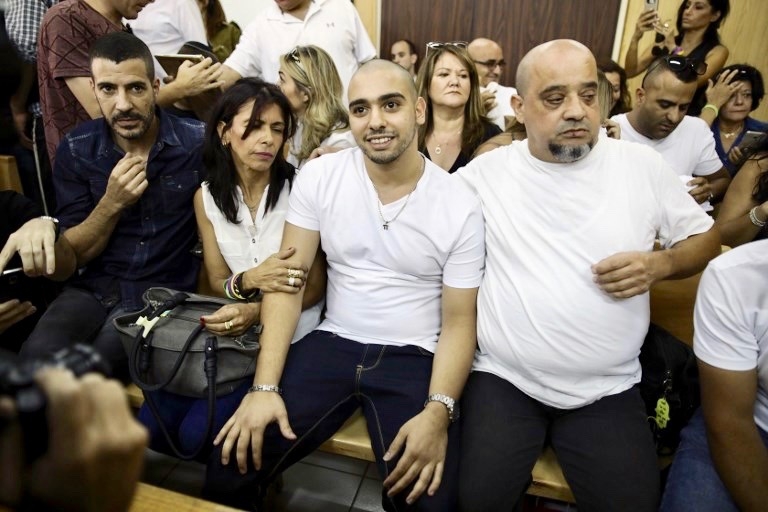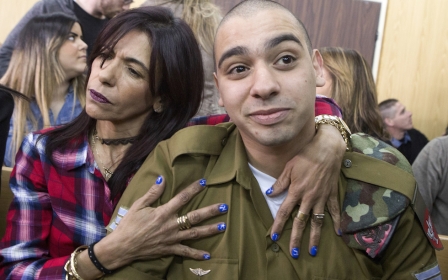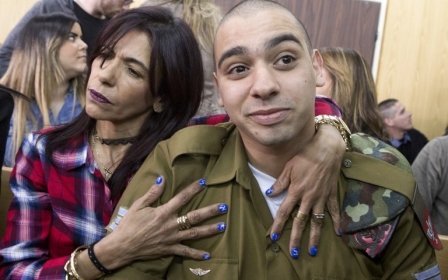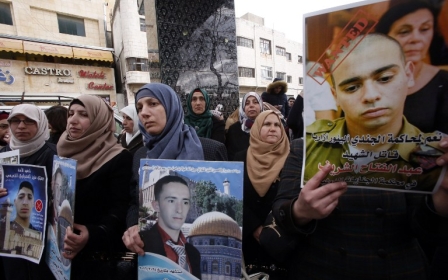Israeli soldier Azaria's manslaughter conviction upheld

A military court on Sunday upheld a manslaughter conviction and 18-month prison sentence for an Israeli soldier who shot dead a Palestinian assailant in a case that deeply divided the country.
In addition to upholding the conviction, military judges also rejected an appeal by prosecutors to increase the sentence for Elor Azaria, a sergeant and military medic at the time of the incident, according to the ruling.
"Soldiers should not settle their differences with the terrorists once they are no longer in danger - that's up to the judiciary," the president of the military court, Major General Doron Piles, said.
"The accused did not shoulder the responsibility of his actions and has not once expressed any doubt... The appeal was therefore rejected by all the judges," he said.
Prime Minister Benjamin Netanyahu immediately repeated his call for a pardon for Azaria, whose actions drew harsh criticism from the military's top brass.
"My opinion has not changed when it comes to granting pardon to Elor Azaria and remains consistent to what I said after the verdict," Netanyahu said on Twitter.
"When the subject is discussed concretely, I will give my recommendation to the competent authorities."
The family of the Palestinian assailant, Abdel Fattah al-Sharif, were surprised by the verdict, saying in a statement: “We were certain Elor Azaria would be exonerated” by the appellate court, Channel 2 news reported.
The family said it “opposes all forms of violence, by Palestinians and Israelis alike”.
The 21-year-old French-Israeli was convicted in January and sentenced in February.
He later appealed the verdict, while military prosecutors asked for an increased sentence after having initially requested between three and five years.
Azaria arrived at the military court in Tel Aviv on Sunday in a white V-neck shirt, smiling and hugging family members as he has done at previous hearings.
He completed his mandatory three-year military service on 20 July and was moved from confinement to his base to house arrest.
His imprisonment had been postponed pending his appeal.
His lawyer, Yoram Sheftel, said Azaria has until 9 August to appeal the verdict and that he would be preparing to submit such a request to the supreme court "within 10 days".
But Defence Minister Avigdor Lieberman has argued against an appeal, which analysts said the top court would not examine.
"This is not an easy day, but it is the verdict, and the court must be respected," Lieberman said.
"I am asking the Azaria family not to continue the appeal process... and to bring an end to this matter as quickly as possible for the good of Elor, his family and the Israeli people."
He said Azaria could request a pardon from the military chief of staff.
The chief of staff, Gadi Eisenkot, said in a statement on Sunday that he would "seriously" consider reducing the jail sentence "and taking into account all considerations" in the case.
Azaria can also ask for a pardon from President Reuven Rivlin. A source close to Rivlin said that no such request had yet been filed.
The March 2016 shooting in the occupied West Bank city of Hebron was recorded on video by a rights group and spread widely online.
It showed Abdul Fattah al-Sharif, 21, lying wounded on the ground, shot along with another Palestinian after stabbing and wounding a soldier, according to the army.
Azaria then shot him in the head without any apparent provocation.
He said he feared Sharif was wearing an explosive belt and could blow himself up, a claim judges rejected.
"His motive for shooting was that he felt the terrorist deserved to die," Judge Colonel Maya Heller said when reading the verdict in January.
The trial captivated Israel and highlighted deep divisions in public opinion between those who decry the shooting and those who say it was justified.
Military leaders strongly condemned Azaria's actions.
However, right-wing leaders, including Netanyahu, have called for him to be pardoned in an extraordinary public rift between politicians and the military.
Rights group Amnesty International has said Azaria's sentence does "not reflect the gravity of the offence", and the UN human rights office said it was an "unacceptable" punishment for "an apparent extra-judicial killing".
New MEE newsletter: Jerusalem Dispatch
Sign up to get the latest insights and analysis on Israel-Palestine, alongside Turkey Unpacked and other MEE newsletters
Middle East Eye delivers independent and unrivalled coverage and analysis of the Middle East, North Africa and beyond. To learn more about republishing this content and the associated fees, please fill out this form. More about MEE can be found here.




